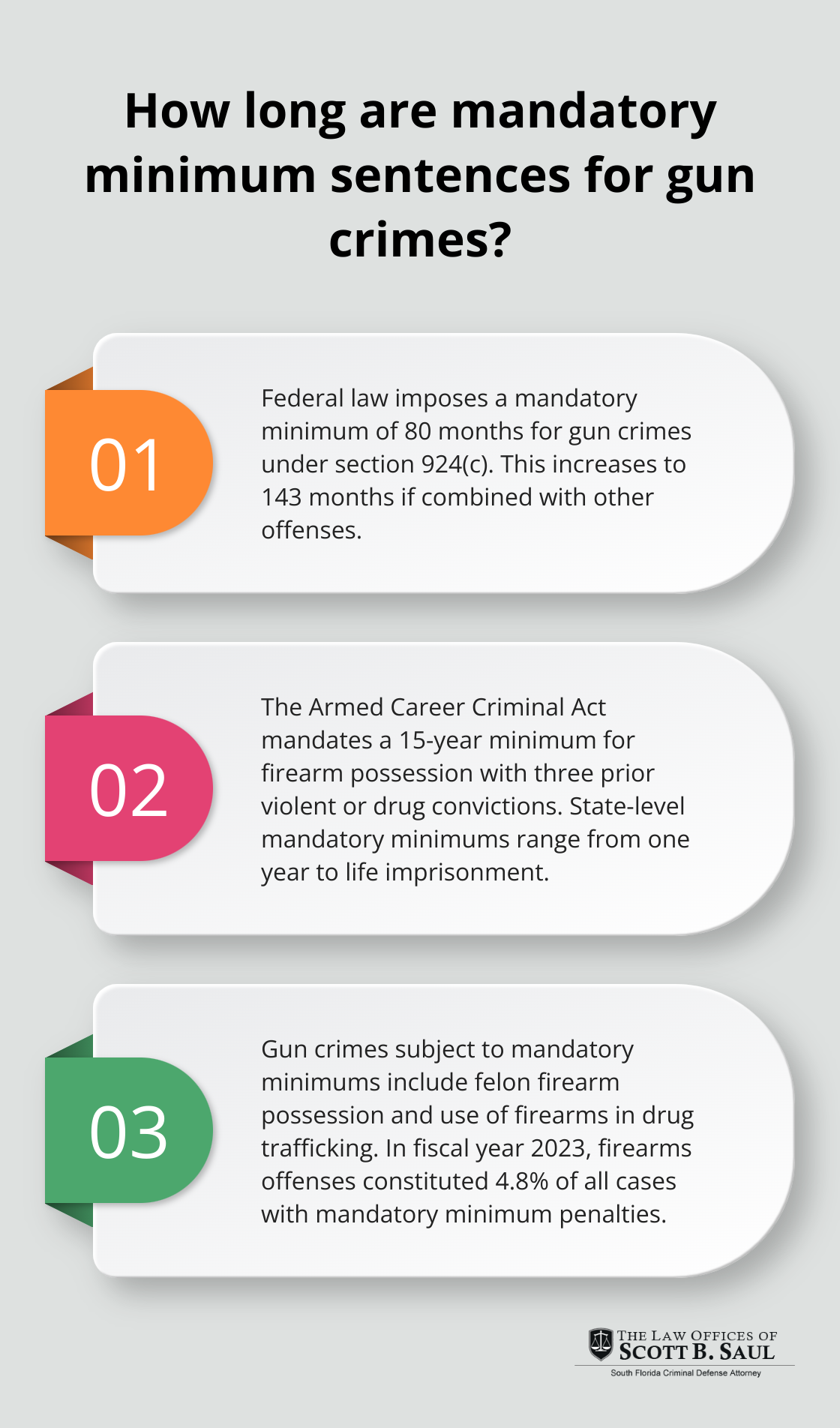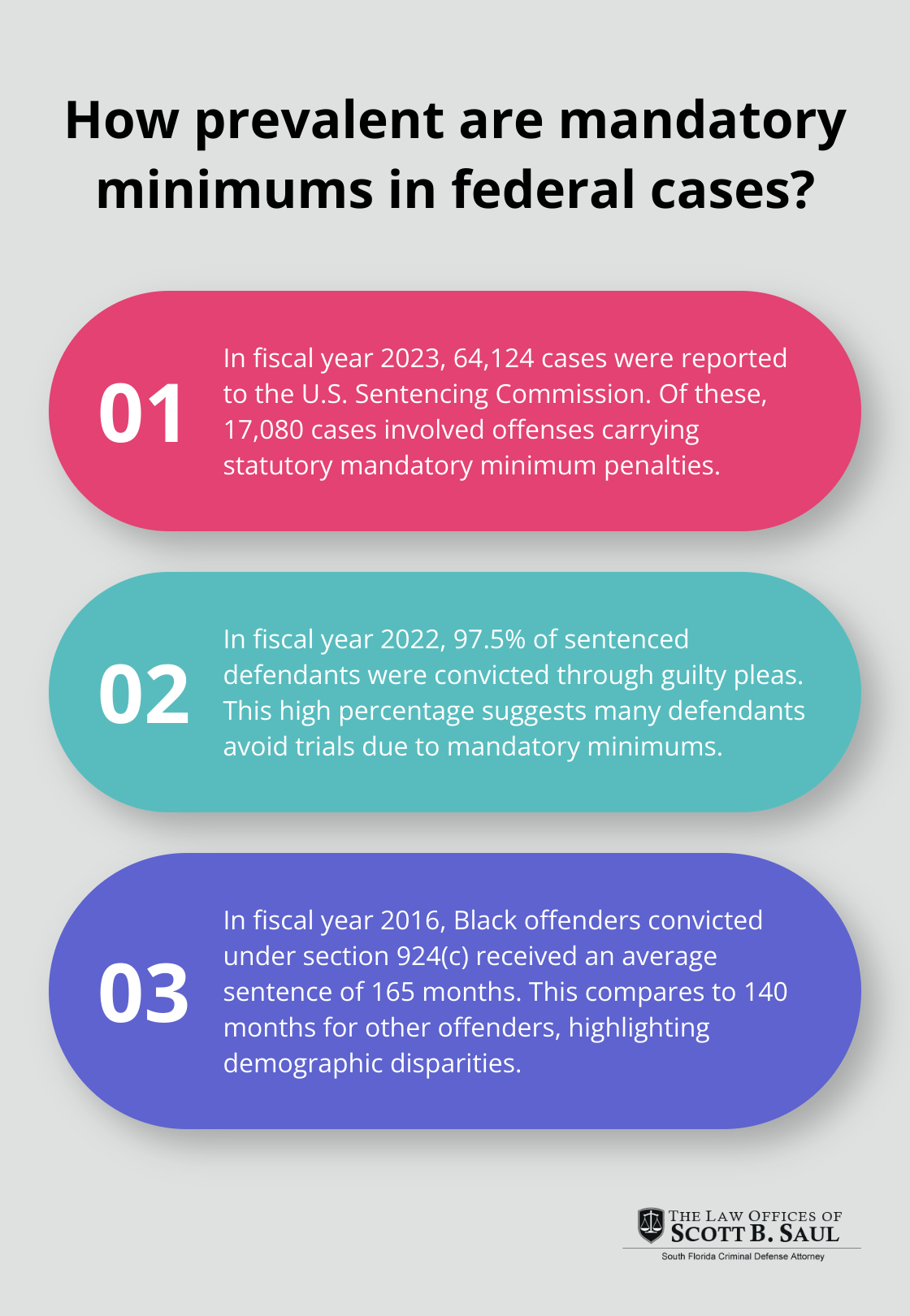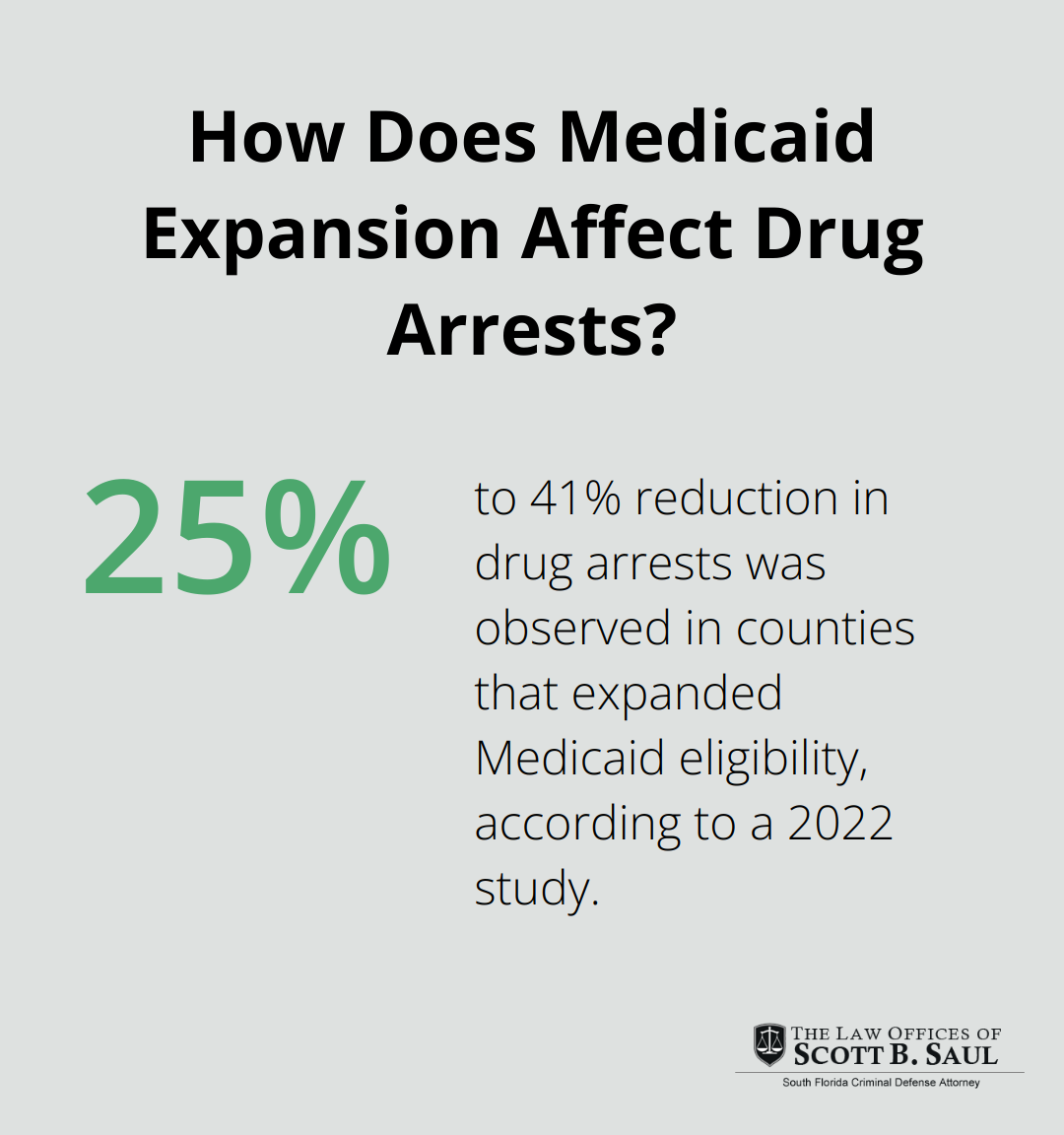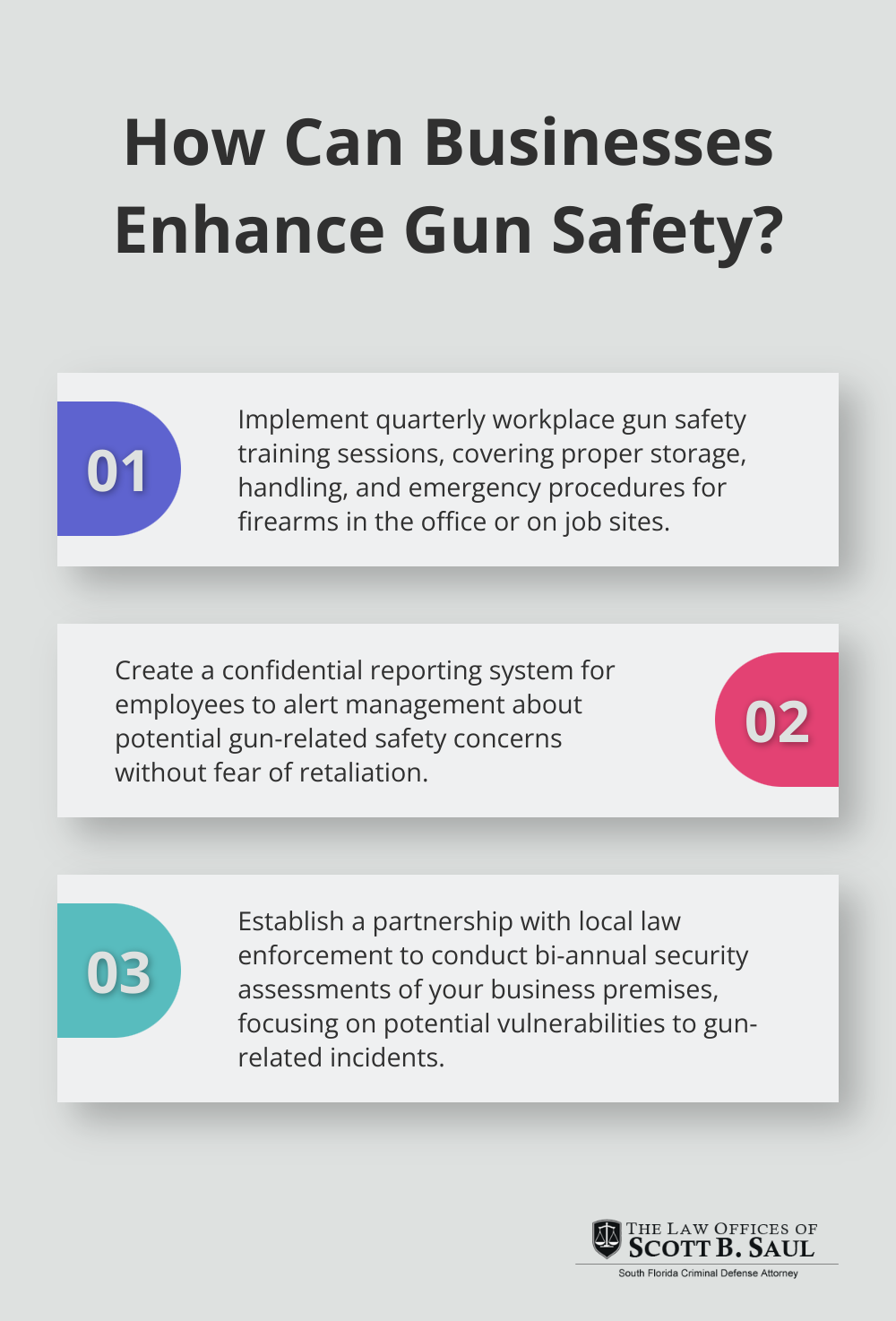Understanding Mandatory Minimums for Gun Crimes
By : saulcrim | Category : Criminal Defense | Comments Off on Understanding Mandatory Minimums for Gun Crimes
7th Mar 2025

Mandatory minimum sentences for gun crimes have become a hot-button issue in the American legal system. These laws significantly impact how gun-related offenses are prosecuted and sentenced, often leading to lengthy prison terms.
At Law Offices of Scott B. Saul, we’ve seen firsthand how these mandatory minimums can affect defendants and their families. Understanding these laws is essential for anyone facing gun-related charges or interested in criminal justice reform.
What Are Mandatory Minimums for Gun Crimes?
Mandatory minimum sentences for gun crimes are fixed prison terms set by law. These laws remove judicial discretion to impose shorter sentences. Both federal and state levels have enacted these laws to punish offenders severely and deter gun violence.
Federal Gun Laws and Mandatory Minimums
The most common federal mandatory minimum for gun crimes comes from 18 U.S.C. § 924(c). This law imposes a mandatory minimum sentence of 80 months for individuals convicted only under section 924(c), and 143 months for individuals also convicted of other offenses.

The Armed Career Criminal Act (ACCA) is another significant federal law. It mandates a 15-year minimum term of imprisonment for individuals with three prior violent felony or serious drug offense convictions who possess a firearm. This law has faced scrutiny. The U.S. Supreme Court ruled in Erlinger v. United States that juries, not judges, must determine if prior offenses qualify for ACCA enhancement.
State Gun Laws and Variations
State laws on gun crimes differ widely. Many states have adopted their own versions of mandatory minimums. Some states impose minimum sentences for possessing firearms with obliterated serial numbers or for using firearms in school zones. These state-level mandatory minimums can range from one year to life imprisonment, depending on the offense and jurisdiction.
Types of Gun Crimes Subject to Mandatory Minimums
Gun crimes that typically trigger mandatory minimums include:
- Possession of a firearm by a felon
- Use of a firearm in drug trafficking
- Illegal sale or transfer of firearms
- Possession of certain types of firearms (e.g., automatic weapons)
- Gun trafficking across state lines
The U.S. Sentencing Commission reports that in fiscal year 2023, firearms offenses constituted 4.8% of all cases carrying mandatory minimum penalties. This statistic highlights the significant role these laws play in the criminal justice system.
Impact on Legal Representation
The complexity of these laws makes expert legal representation essential in gun crime cases. The interplay between federal and state laws, combined with the severe consequences of mandatory minimums, creates a challenging legal landscape. Defendants need attorneys who understand these nuances and can navigate the system effectively.
The next section will explore how these mandatory minimums impact gun crime cases, from reduced judicial discretion to increased pressure for plea bargaining.
How Mandatory Minimums Reshape Gun Crime Cases
Judicial Discretion Curtailed
Mandatory minimums for gun crimes have significantly altered the criminal justice landscape. These rigid sentencing structures have stripped judges of their power to tailor sentences to individual circumstances. Of the 64,124 cases reported to the Commission in fiscal year 2023, 17,080 involved an offense carrying a statutory mandatory minimum penalty. This statistic highlights how frequently judges must impose sentences they might consider excessive or inappropriate for specific cases.
Plea Bargaining Pressure Intensifies
The threat of lengthy, guaranteed sentences has dramatically increased the pressure on defendants to accept plea bargains. Many individuals plead guilty to lesser charges, even when they believe in their innocence, to avoid the risk of harsh mandatory sentences. Data from the U.S. Sentencing Commission reveals that in fiscal year 2022, an astounding 97.5% of sentenced defendants were convicted through guilty pleas. This high percentage suggests that many defendants forego their right to trial due to the looming specter of mandatory minimums.
Disproportionate Impact on Minority Communities
The application of mandatory minimums has shown a stark disparity in its effect on certain demographics, particularly minority communities. According to the U.S. Sentencing Commission, Black offenders convicted under section 924(c) received an average sentence of 165 months, compared to 140 months for other offenders in fiscal year 2016. This disparity raises serious questions about the equitable application of these laws and their role in perpetuating systemic inequalities within the criminal justice system.
Challenges for Legal Defense
The complexity of mandatory minimum laws creates significant challenges for legal defense strategies. Attorneys must navigate a intricate web of federal and state regulations, each with its own set of mandatory sentences. This complexity often requires specialized knowledge and experience to effectively represent clients facing gun crime charges.
Long-Term Consequences
Mandatory minimums for gun crimes often result in lengthy prison sentences, which can have far-reaching consequences beyond the immediate punishment. These sentences can lead to family separation, loss of employment opportunities, and difficulties in reintegration into society upon release. The long-term effects of these harsh sentences extend well beyond the courtroom, impacting communities and individuals for years to come.

The impact of mandatory minimums on gun crime cases has reshaped the entire legal process, from arrest to sentencing. As we examine these effects, it becomes clear that these laws have sparked significant controversy and debate within the legal community and beyond. The next section will explore the criticisms and controversies surrounding mandatory minimums for gun crimes, shedding light on the ongoing discussions about their effectiveness and fairness.
Are Mandatory Minimums Effective?
Mandatory minimums for gun crimes have ignited intense debate within the legal community and among policymakers. While proponents argue these laws deter crime and ensure consistent punishment, critics point to numerous unintended consequences that raise questions about their effectiveness and fairness.
Prison Overcrowding and Fiscal Strain
One of the most visible impacts of mandatory minimums is the surge in prison populations. The Bureau of Justice Statistics reports that nearly 60% of federal gun crime convictions result in sentences that include mandatory minimums. This influx of long-term inmates has led to severe overcrowding in many facilities, which strains resources and creates unsafe conditions for both inmates and staff.

The fiscal impact is equally concerning. The Brookings Institution suggests that addressing socioeconomic factors may reduce gun crimes more effectively than mandatory sentencing alone. A 2022 study showed that counties that expanded Medicaid eligibility reduced drug arrests by 25% to 41%. The high costs of lengthy incarcerations place a significant burden on taxpayers.
Unintended Consequences and Unjust Outcomes
Mandatory minimums often lead to sentences that many consider disproportionate to the crime committed. The U.S. Sentencing Commission data shows that 21.6 percent of offenders who received relief from the mandatory minimum penalty under section 924(c) for providing substantial assistance received average sentences below the mandatory minimum. This rigidity can result in first-time offenders or those with mitigating circumstances receiving the same harsh sentences as hardened criminals.
The “trial penalty” is another troubling aspect of these laws. Defendants who exercise their right to a trial risk facing much harsher sentences if convicted, compared to those who accept plea deals. This pressure to plead guilty, even when innocent, undermines the fundamental principles of justice our system is built upon.
Deterrence Effectiveness in Question
The primary argument for mandatory minimums is their supposed deterrent effect on crime. However, a 2020 study indicated that these sentences do not effectively deter gun crimes, suggesting a need for reform focused more on rehabilitation. The National Institute of Justice reported that areas with tougher gun laws tend to experience lower rates of gun violence, though the specific impact of mandatory minimums remains unclear and requires further research.
Racial Disparities and Community Impact
Perhaps most concerning are the documented disparities in how mandatory minimums apply. Studies show that marginalized communities often face harsher penalties under these laws. The Sentencing Project reports that approximately 1 in 3 people incarcerated for gun crimes are sentenced to mandatory minimums that prevent judicial discretion (with a disproportionate impact on minority offenders).
This uneven application of justice not only affects individuals but entire communities. The American Psychological Association indicates that many offenders of gun crimes suffer from mental health issues, which are often not addressed under mandatory sentencing guidelines. This failure to address root causes can perpetuate cycles of crime and incarceration.
Final Thoughts
Mandatory minimum sentences for gun crimes have transformed the U.S. criminal justice system. These laws aim to deter gun violence and ensure consistent punishment, but they have sparked intense debate due to their far-reaching consequences. The impact extends beyond the courtroom, affecting individuals, families, and entire communities.

Recent studies question the effectiveness of these laws in reducing gun crimes. The high costs of lengthy incarcerations and potential for unjust outcomes have led many to call for reform. Experts suggest focusing on rehabilitation and addressing root causes of crime as more effective approaches to public safety.
For defendants facing gun-related charges, understanding these complex laws is vital. The severe consequences of mandatory minimums require expert legal representation. Law Offices of Scott B. Saul offers experienced criminal defense for those facing gun crime charges, with a strong track record in over 300 jury trials.
Archives
- July 2025 (1)
- June 2025 (9)
- May 2025 (9)
- April 2025 (8)
- March 2025 (9)
- February 2025 (8)
- January 2025 (9)
- December 2024 (10)
- November 2024 (5)
- July 2024 (2)
- June 2024 (2)
- May 2024 (2)
- April 2024 (2)
- March 2024 (2)
- February 2024 (2)
- January 2024 (2)
- December 2023 (2)
- November 2023 (2)
- October 2023 (2)
- September 2023 (2)
- August 2023 (1)
- July 2023 (2)
- June 2023 (2)
- May 2023 (2)
- April 2023 (2)
- March 2023 (2)
- February 2023 (2)
- January 2023 (2)
- December 2022 (2)
- November 2022 (2)
- October 2022 (2)
- September 2022 (2)
- August 2022 (2)
- July 2022 (2)
- June 2022 (2)
- May 2022 (2)
- April 2022 (2)
- March 2022 (2)
- February 2022 (2)
- January 2022 (2)
- December 2021 (2)
- November 2021 (2)
- October 2021 (2)
- September 2021 (2)
- August 2021 (2)
- July 2021 (2)
- June 2021 (2)
- May 2021 (2)
- April 2021 (2)
- September 2020 (5)
- July 2020 (4)
- June 2020 (4)
- May 2020 (4)
- April 2020 (5)
- March 2020 (4)
- February 2020 (4)
- January 2020 (4)
- December 2019 (1)
- November 2019 (4)
- October 2019 (4)
- September 2019 (4)
- August 2019 (4)
- July 2019 (5)
- June 2019 (4)
- May 2019 (4)
- April 2019 (4)
- March 2019 (4)
- February 2019 (4)
- January 2019 (4)
- December 2018 (4)
- November 2018 (5)
- October 2018 (5)
- September 2018 (4)
- August 2018 (4)
- July 2018 (7)
- June 2018 (4)
- May 2018 (4)
- April 2018 (8)
- March 2018 (4)
- February 2018 (4)
- January 2018 (4)
- November 2017 (4)
- October 2017 (4)
- September 2017 (4)
- August 2017 (7)
- July 2017 (6)
- June 2017 (4)
- May 2017 (4)
- April 2017 (4)
- March 2017 (4)
- February 2017 (7)
- January 2017 (4)
- December 2016 (7)
- November 2016 (4)
- October 2016 (4)
- September 2016 (10)
- August 2016 (4)
- July 2016 (4)
- June 2016 (4)
- May 2016 (4)
- April 2016 (4)
- March 2016 (4)
- February 2016 (7)
- January 2016 (4)
- December 2015 (5)
- November 2015 (4)
- October 2015 (7)
- September 2015 (4)
- August 2015 (4)
- July 2015 (13)
- June 2015 (9)
- May 2015 (8)
- April 2015 (6)
- March 2015 (4)
- February 2015 (4)
- January 2015 (4)
- December 2014 (4)
- November 2014 (4)
- October 2014 (4)
- September 2014 (3)
Categories
- Adjudication (1)
- Bankruptcy (1)
- Burglary Crimes (3)
- calendar call (1)
- Car Accident (1)
- Criminal Defense (332)
- Cyber Crimes (7)
- DNA (1)
- Domestic Violence (9)
- Drug Crimes (5)
- DUI (12)
- Embezzlement (1)
- Environmental Crimes (4)
- Expungement Law (2)
- Federal Sentencing Law (3)
- Firearm (3)
- Forgery (4)
- General (82)
- Healthcare (3)
- Immigration (1)
- Indentity Theft (1)
- Insurance (5)
- judicial sounding (2)
- Juvenile Crimes (4)
- Manslaughter (4)
- Money Laundering (3)
- Organized Crime (1)
- Racketeering (1)
- Reckless Driving (3)
- RICO (3)
- Sealing and Expunging (2)
- Sex Offense (1)
- Shoplifting (1)
- Suspended Driver's License (1)
- Traffic (4)
- Trending Topics (1)
- White-collar Offenses (1)

